Searching for the best Chainlink wallets to secure your LINK bag? There is no denying that Chainlink has the potential to be one of the most successful cryptocurrency projects. The protocol is being heavily integrated into decentralised finance (DeFi) applications as a trusted price oracle, and adoption levels have soared since its launch.
If LINK lives up to its potential, the last thing you’d want is to be among those who make news headlines for losing their cryptocurrencies because they're not securing them properly.
Table of Contents
To spare you the heartache, this article lists the best wallets to store your LINK tokens and the pros and cons of each option. There is also a guide on choosing from the lot and securing your assets from hackers.
First, though, let’s consider some of the factors to consider when shopping for a Chainlink purse :)
What should you look for in a Chainlink wallet?
Security: Although numerous crypto wallets exist today and claim to have the best security practices, many users still lose their funds to minor loopholes. Hence, it is vital that you consider the security setup for any wallet you choose for your LINK assets.
Security features such as two-factor authentication (2FA), biometric and face unlock, and advanced password setups are compulsory for the best security results. A responsive customer support desk is also essential if any security issues arise.
Friendly User Interface: It should be relatively easy for you to move and receive funds using your preferred Chainlink wallet. Other features, such as viewing balances, copying addresses, and QR codes, must be neatly presented for the best user experience.
Support for DeFi: As we noted earlier, Chainlink is a core protocol for DeFi projects, and thus holders can lend, borrow or earn interest on their assets using selected applications. If you intend to store and use LINK for this purpose, you need a wallet that can easily interact with DeFi protocols.
Best Chainlink wallets
1. Ledger Nano X
- Wallet Type: Hardware
- Price: £136
- Available apps: Desktop, iOS, Android
- Number of Supported Coins: 5000+ (Chainlink, Bitcoin, Ether, XRP, Litecoin, etc.)
Pros
- Easy to set up for first-time users.
- Securely store LINK and other ERC-20 tokens.
- Connect with DeFi apps that support the Ledger wallet directly.
- Buy LINK using credit or debit cards via Ledger’s partner, Coinify.
- Responsive customer support
Cons
- Slightly expensive for small investors.
- Ledger (the company) has lost customers’ personal information to security breaches.
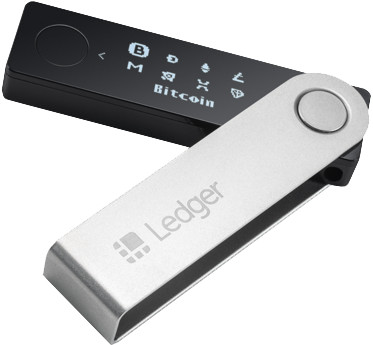
The Ledger Nano X is a USB-shaped hardware wallet with Bluetooth functionality. The device stores the keys to your coins offline and allows you to view wallet balances or make new purchases via the Ledger Live app.
The Nano X weighs a mere 34g and is made with brushed steel and plastic. There is a connector for linking the device to your phone or PC, as it is compatible with most new-generation smartphones and computers.
2. Trezor Model T
- Wallet Type: Hardware
- Price: €262.80
- Available apps: Desktop, Browser, Android
- Number of Supported Coins: 1200+ (Chainlink, Bitcoin, Ethereum, XRP, Cardano, etc.)
Pros
- Easy and straightforward setup.
- Safely store LINK, ETH, and other ERC-20 tokens.
- The device can also be a hardware token and password manager for your digital accounts.
- The presence of a touchscreen offers a more intuitive and user-friendly experience.
- Buy and sell LINK and other cryptos via Trezor Suite.
- Excellent customer support desk.
Cons
- The Trezor Suite/App is not available on iOS devices.
- The wallet is not readily supported for connection with DeFi apps
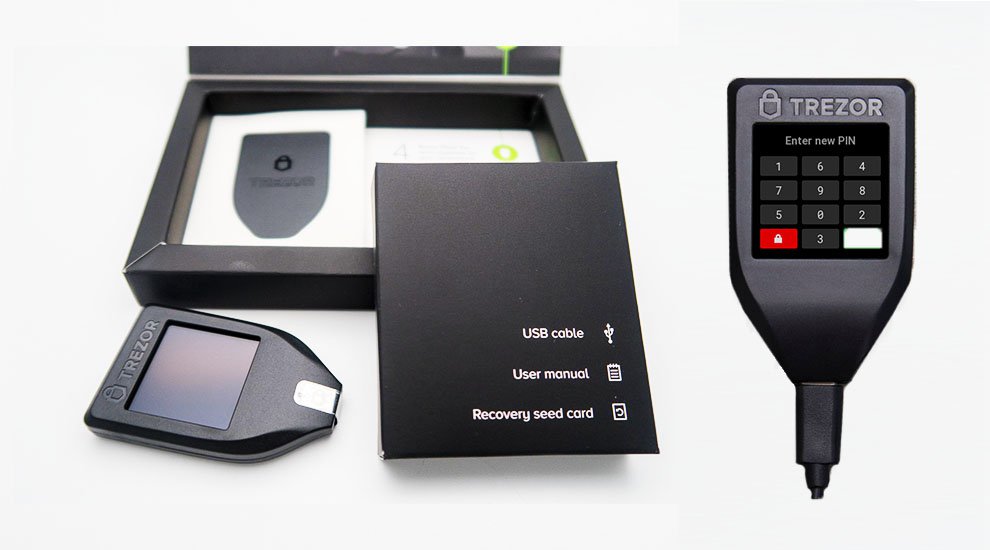
The Trezor Model T is another popular hardware wallet for storing crypto. It holds many advanced environmental and security certifications, including CE and RoHS, and supports mobile phone and computer connectivity.
The device has a bright-coloured LCD touchscreen with 240 x 240 pixels, sufficient for users to view and verify transactions clearly. The Model T can also serve as a security token for securing your digital ID across other apps and crypto exchanges.
3. Metamask
- Wallet Type: App
- Price: Free
- Available apps: Web Extension, iOS, Android
- Number of Supported Coins: ETH (LINK and other ERC-20 tokens)
Pros
- Easy to set up and available on multiple devices.
- Store, transfer and receive LINK while retaining your private keys.
- In-built token swap feature to convert LINK to other coins.
- Seamless interaction with DeFi apps and protocols
- Portfolio tracker for managing your assets across different protocols and networks.
- Support for other EVM-compatible blockchains, e.g., BNB Chain, Polygon, etc.
Cons
- The wallet is internet-based and thus susceptible to breaches if users do not practice advanced security practices.
- Users report slightly higher fees when using the in-built swap feature.
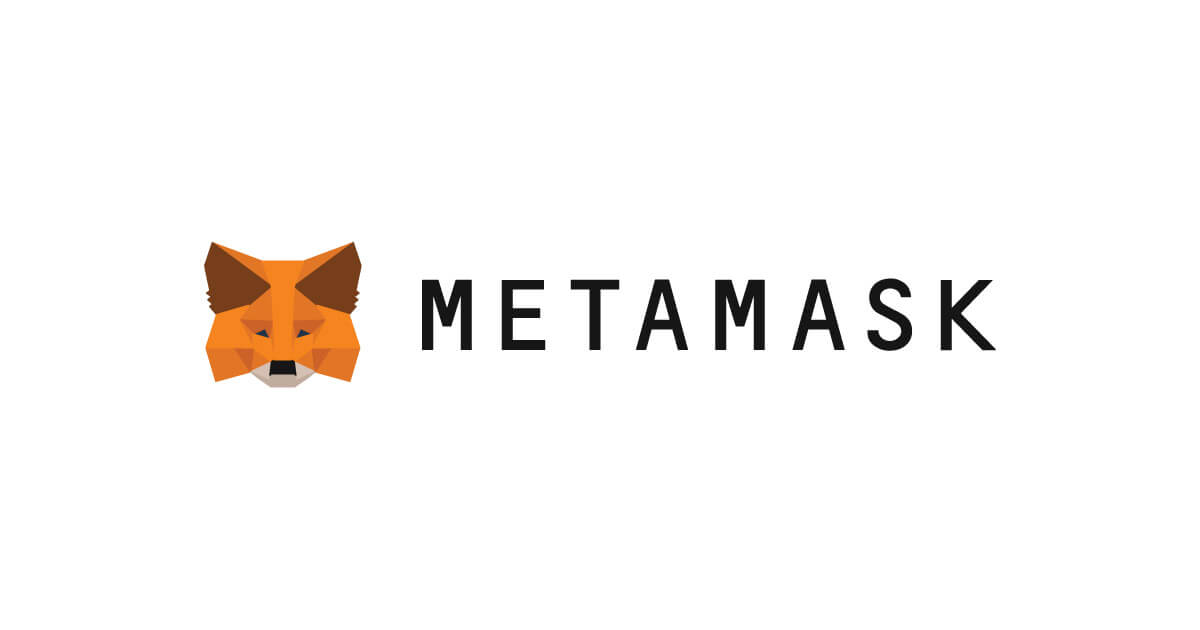
Metamask is a popular Ethereum-focused wallet released by Ethereum Foundation-backed startup, Consensys. The wallet’s primary feature is allowing users to access decentralised applications.
However, its compatibility with ERC-20 tokens like LINK means it is an excellent option for storing your tokens. Aside from popular tokens, users can also view other Ethereum-based assets by using the “Add Token” function and providing the contract address for the asset.
4. Coinbase Wallet
- Wallet Type: App
- Price: Free
- Available apps: Web Extension, iOS, Android
- Number of Supported Coins: 1000+ (Bitcoin, Ether, XRP, Litecoin, Dogecoin, Stellar Lumens, LINK and other ERC-20 tokens)
Pros
- User-friendly interface across all supported devices.
- Users can hold their private keys and securely store, send and receive LINK.
- Buy LINK and other cryptocurrencies by linking your Coinbase account.
- Users can transfer funds via usernames instead of long-string addresses.
- Connect with decentralised applications.
Cons
- It is not as secure as a hardware wallet.
- The affiliation with Coinbase reduces user privacy.

Coinbase Wallet is developed by the popular cryptocurrency exchange, Coinbase, and represents the custodial version of their products. Unlike your normal Coinbase account, where you log in via email and password and the exchange stores your private keys, the Coinbase wallet gives you full control.
You can store LINK and ERC-20 tokens, interact with DeFi apps, and even hold collectibles such as non-fungible tokens (NFTs). Coinbase Wallet is popular for its seamless user experience and has also improved significantly by allowing support for more blockchains.
5. Coinomi Wallet
- Wallet Type: App
- Price: Free
- Available apps: Desktop, iOS, Android
- Number of Supported Coins: 120+ blockchain and their native tokens (Chainlink, Bitcoin, Ether, Digibyte, Dogecoin, Stellar Lumens, etc.)
Pros
- Streamlined and user-friendly
- Users can hold their private keys and securely store, send and receive LINK.
- The in-built exchange allows for the conversion of LINK to other assets.
- Buy and sell LINK using credit and debit cards.
- Live customer support for user enquiries.
Cons
- Not available as a web extension
- Not fully optimised for DeFi applications.
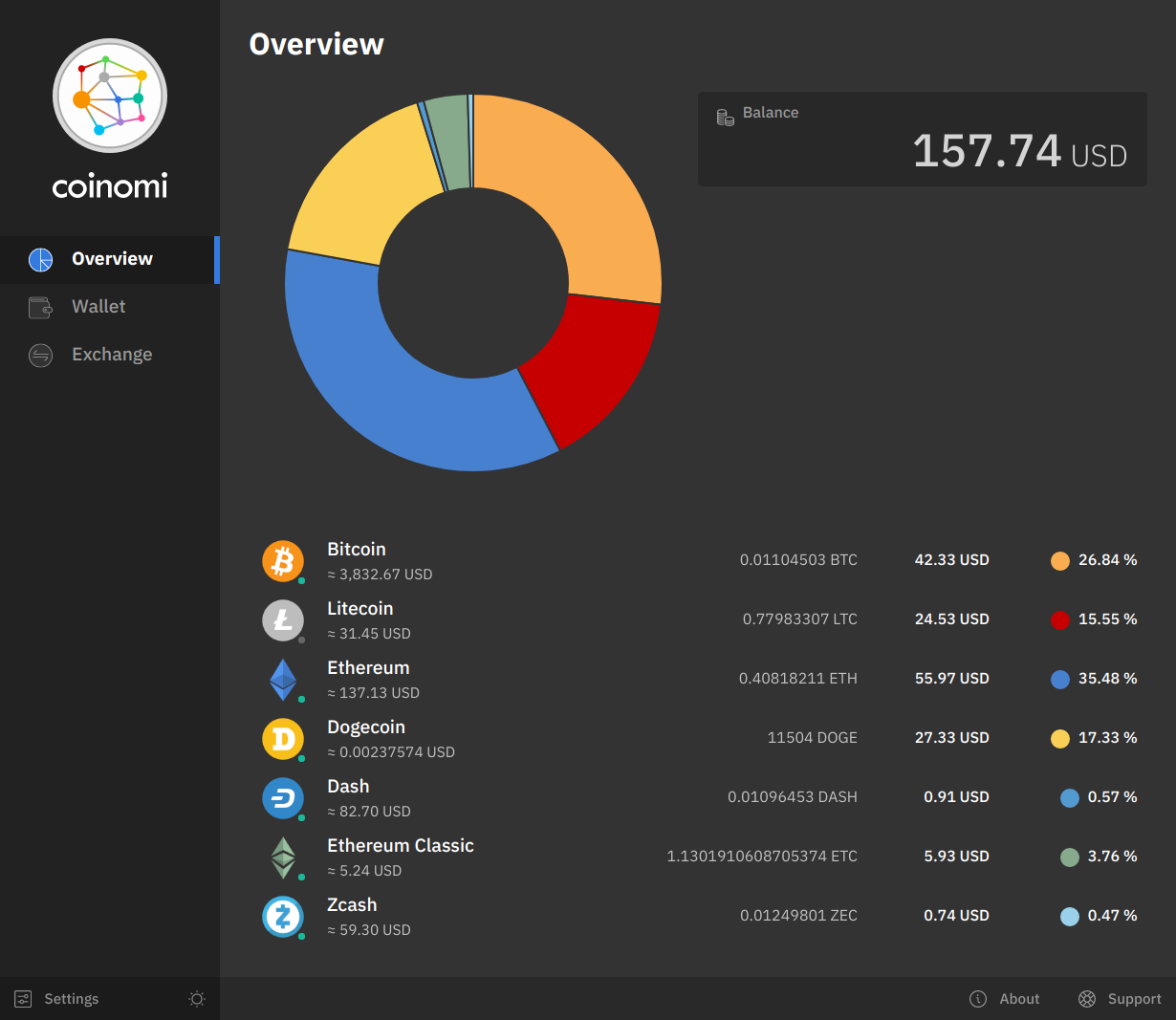
Launched in 2014, Coinomi is one of the oldest cryptocurrency wallets, offering enhanced privacy and anonymity. The app, available on multiple devices, features a user-friendly interface and support for multiple blockchains, including Ethereum.
Hence, you can store most ERC-20 tokens, including LINK, using Coinomi. Although not fully optimised for decentralised apps, you can access basic functionalities such as swapping on a DEX or storing your non-fungible tokens (NFTs).
6. Trust Wallet
- Wallet Type: App
- Price: Free
- Available apps: Web Extension, Android, iOS
- Number of Supported Coins: 160k+ coins and tokens (LINK, Bitcoin, Ether, Binance coin, Tomochain etc.)
Pros
- Fully custodial with support for sending and receiving LINK tokens.
- Users can customise transaction fees based on network demand.
- In-built DEX for converting between LINK and other ERC-20 tokens.
- Fully optimised for decentralised applications, including DeFi and collectibles.
- Supports other EVM blockchains, e.g., BNB Chain, Polygon, Avalanche etc.
Cons
- Users report a high price spread while using the in-built DEX.
- Being a hot wallet makes it less secure.
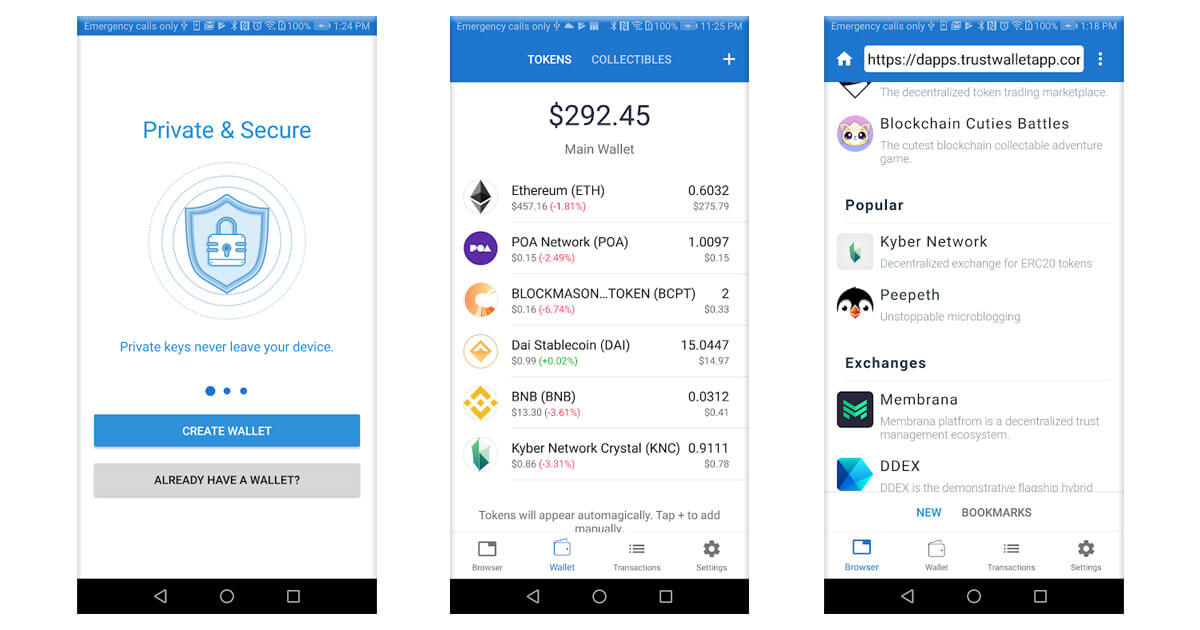
Trust Wallet launched in 2017 and has quickly become one of the most popular mobile wallets, with over ten million users. The popularity isn’t surprising as Trust Wallet adopts a mobile-first approach and has only recently launched as a web extension.
The app is easy to navigate, supports a healthy number of coins, and primarily allows access to Ethereum-based decentralised applications. Thus, you can store your LINK tokens and use them on supported DeFi apps.
7. Binance Exchange Wallet — Where to Buy Chainlink
- Wallet Type: Exchange
- Price: Free
- Available apps: Desktop, Android, iOS
- Number of Supported Coins: 200+ coins and tokens (LINK, Bitcoin, Ether, Binance coin, Dogecoin, XRP, etc.)
Pros
- Send and receive LINK tokens
- Earn interest on LINK savings products
- Exchange LINK for other cryptocurrencies or buy with several fiat payment methods.
- Available on multiple devices with seamless synchronisation of fund balances.
- Advanced trading functionalities, including leveraged trading for LINK contracts.
Cons
- Users do not hold their private keys.
- No access to decentralised applications.

Binance is a popular cryptocurrency exchange platform that supports various LINK trading products, deposits, and withdrawals.
While storing large funds on the exchange is not recommended, Binance is one of the few tier-one exchanges where users with little knowledge of advanced crypto security tips can store their assets in the short term. Binance also offers low-yield savings products for LINK holders and the added option for users to set up non-custodial wallets linked to their Binance accounts.
How to choose the best LINK wallet
To choose the best LINK wallet, you need to evaluate your needs as an investor. For instance, you need to consider if you only need a secure solution for long-term storage or a wallet that can interact with DeFi apps.
Also, you need to review if you want a wallet that lets you purchase LINK and other cryptocurrencies with fiat using credit or debit cards. There is the added use case of being able to stake LINK tokens when the opportunity is open to investors.
Putting these factors into consideration, here is a summary of the best Chainlink wallets covered in this article and when they might work best:
- Long-term Storage: Ledger Nano X and Trezor Model T
- Using DeFi apps: Metamask and Coinbase Wallet
- Mobile Wallet: Coinomi and Trust Wallet
- Exchange: Binance.
You can also combine different wallet options for the best experience and segregation of your short-term and long-term holdings.
How to get a Chainlink wallet
You can get a Chainlink wallet by ordering the hardware devices (Ledger or Trezor) from their official stores. We have included links to this article for convenience, and we highly recommend only purchasing these items from official sources. Items ordered from third-party vendors are not highly secure and may be tampered with during shipping. Similarly, wallets downloaded from unofficial sources may contain malware or other security risks.
For mobile and desktop wallets, you can also download them from the respective wallet providers using the links provided. They are relatively easy to install, and you can send or receive LINK tokens within a few minutes.
How to keep your coins safe
Aside from downloading or purchasing wallets from official sources, you can also keep your LINK assets safe by keeping the following tips in mind:
- Back up your private key or passphrase in a secure offline location. At least two copies of the key or phrase are essential for easy recovery during a loss.
- Never disclose your crypto holdings in public places or social media groups. Such a showy display can put you on hackers' radar or expose you to physical attacks from robbers.
- Always double-check addresses before transferring funds. Also, be cautious about mistakenly copying contract addresses instead of the receiving address. This common error could result in a permanent loss of funds.
- Hardware wallets are still the best-known option for long-term crypto storage. If you hold substantial amounts, then you must consider investing in one.
Conclusion
As shown by its market valuation and adoption, Chainlink has the potential to become one of the most successful blockchain-based projects. The LINK token, which powers the network, currently boasts over five hundred thousand (700k) holders.
This article revealed the best Chainlink wallets in the market, providing an overview of how investors can select the one that matches their investment needs. One can combine any available options to properly manage LINK assets while hoping Chainlink lives up to the hype.





 usdt
usdt xrp
xrp

